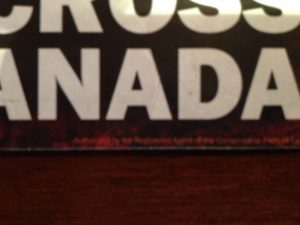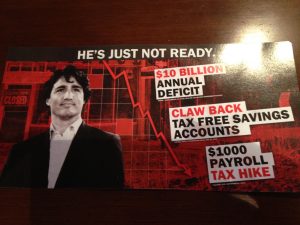Politics
Unnecessary Movie Audience Restrictions
Hieronymus Bosch. A late-Medieval Dutch painter and an artist whose work intrigues my son.
This month the Vancouver International Film Festival Society (VIFF) is screening a movie about curators preparing an upcoming exhibition of Bosch’s work. How interesting! How cultural! How … wait a minute: what do you mean I can’t take my son to see the film?
It turns out that if a film is unclassified, the regulations prohibit the sale of a ticket to anyone under 19. How absurd! Furthermore, when a film is classified and those under 19 are able to attend, the VIFF theatre concession can no longer serve its adult patrons alcohol. How ridiculous!
So, I’ve written a letter to Minister Oakes urging her to cut this red tape and I will mail it this evening.
If you share my point of view on this, please write the Minister, too.
The more she hears from BC voters, the more likely the government will address these anachronistic provisions, which make a mockery of consumer protection.
September 2, 2016
Honourable Coralee Oakes
Minister of Small Business, Red Tape Reduction
& Responsible for the Liquor Distribution Branch
P.O.Box 9054, STN Prov Govt
Victoria, BC V8W9E2
Dear Minister Oakes,
I had wanted to buy tickets for my family to one of the Vancouver International Film Festival Society (VIFF) screenings of a movie about Hieronymus Bosch, the visionary late-Medieval Dutch painter.
Unfortunately, I’m unable to do so since the movie is unclassified and I cannot buy a ticket for my fifteen year-old son.
My son is an artist and has long been intrigued by Bosch’s work. As his parent, I’m very comfortable in accompanying him to this movie. Its content is cultural, informative, historical, and fascinating. It is in no way a threat to his well-being or his psyche. I think anyone would be hard-pressed to argue that he doesn’t have the maturity necessary to watch this particular film.
In inquiring as to why I was unable to take my son to the movie, I have learned that it is provincial law, not VIFF policy, which demands the classification of films before they can be shown to teenagers. Apparently this law covers only theatrical screenings and DVD releases, but not television nor the internet.
This regulatory policy is based on a logical fallacy that an unclassified film is the same as an unsuitable one. It is a level of red tape that not only hinders operations at VIFF, one of Vancouver’s outstanding cultural institutions, but it also assumes that parents are incapable of determining which movies their teenage children may watch.
The same anachronistic regulations prohibit VIFF from allowing liquor in the theatre on Seymour Street when youth under 19 are present. This seems like an unnecessary duplication of restrictions given that concession staff would be prohibited from serving minors. It also diminishes the experience for older patrons who are denied their full privileges simply because the broader classification of a particular movie expands the audience for that particular screening.
I am writing to ask that you review these particular regulations and amend them at the earliest opportunity. Allow teenagers to attend unclassified movies with their parents’ approval and allow liquor service when a movie audience includes those under 19. That would be an effective red tape reduction and a positive support for small business in the cultural sector.
Thank you Minister Oakes for your consideration of the above. I hope that you will take the measures necessary to introduce a more enlightened approach for screenings of unclassified films in Vancouver, whether at the VIFF theatre or at other locations. Such an approach would facilitate the attendance of teens at film events. It is an approach that will draw in younger audiences, not shut them out and without diminishing the experience of older patrons.
Sincerely yours,
Reema Faris
cc.
Honourable Suzanne Anton, Attorney General & Minister of Justice
Jacqueline Dupuis, Executive Director, VIFF Society
Rob Gialloreto, President & CEO, Consumer Protection BC
The Indiscernible Tagline
During last year’s federal election campaign in Canada, I received a direct mail piece that I thought flouted the principles of transparency.
After filing a complaint and an extended correspondence with a representative from the Office of the Commissioner of Canada Elections, I knew that the leaflet met the letter of the regulations. I was adamant that it did not meet the spirit of them.
This is a copy of the letter I mailed today to The Honourable Maryam Monsef asking that she initiate a process to amend the regulations pertaining to the tagline on campaign materials.
August 24, 2016
The Honourable Maryam Monsef
Minister of Democratic Institutions
Centre Block, Suite 546S
House of Commons
Ottawa, Ontario
K1A 0A6
Dear Ms. Monsef,
Please accept my belated congratulations on your successful election as a Canadian Member of Parliament and on your subsequent appointment to Cabinet as the Minister of Democratic Institutions.
Last year’s election campaign was a long one and, on occasion, bitterly fought. In Canada, the integrity of the general voting system is upheld by its overall structure as well as the regulations and operational details of which it is comprised.
While your main focus now is on electoral reform, I would like to draw your attention to a flaw in the regulations of the Canada Elections Act (Act) that pertain to the tagline in campaign marketing materials.
During last year’s federal election campaign, I received many direct mail pieces. There was one in particular that I found objectionable. While the mailer met the requirements of the regulations, it clearly contravened the intent and the spirit of the rules. I have enclosed the original mailer for your reference.
 I filed a complaint about this particular mailer, via an online form, on October 9, 2015. My complaint read as follows:
I filed a complaint about this particular mailer, via an online form, on October 9, 2015. My complaint read as follows:
I received a piece of campaign literature today which is national in scope. It does not clearly identify the sender, the political party, or the official agent. Furthermore, it does not even identify the name of the local candidate in my riding. This appears to me to violate the guidelines, at the very least in spirit, for advertising material. Depending on who paid the costs of production & distribution, it may also violate financing guidelines. (9 October 2015)
The response I received was that the mailer met the requirements of the regulations. Specifically, the email dismissed my concerns as follows:
Thank you for your message of October 9, 2015 with respect to the election advertising leaflet that was distributed in your riding.
The Canada Elections Act (Act) requires that a candidate or registered party who runs an election ad mentions in or on the message that its transmission was authorized by the candidate’s official agent or by the party’s registered agent. The Act is silent as to the size, colour or placement of that mention, which is referred to as the “tagline”. I would draw your attention to the bottom right of the page showing Thomas Mulcair, under the word “Canada” where the following statement appears: “Authorized by the registered agent of the Conservative Party of Canada”. The tagline does appear and provides the information required by the act. (11 October 2015)
 As you can see for yourself, the tagline is barely discernible. I struggled to decipher what it said. It would have been impossible for many to even know that a tagline had been included.
As you can see for yourself, the tagline is barely discernible. I struggled to decipher what it said. It would have been impossible for many to even know that a tagline had been included.
I was not satisfied with the response and had further correspondence with an agent from the Office of the Commissioner of Canada Elections. After sending him a scanned copy of the direct mail piece, I received this response:
Good morning Ms. Faris:
I am familiar with the literature you forwarded me. We had previously reviewed it and as you noted the tag line is included on the ‘Mulcair’ side of this literature. It does state that the political advertising is authorized by the registered agent for the Conservative Party of Canada. Generally speaking, the Act does not control the content of election advertising (or the font size for the authorization line), but regulates the reporting of associated expenses and requires that an authorization statement appear on the advertising.
The literature you received is an initiative from the Conservative Party of Canada and an expense of this political party. It is not associated with the local Conservative Party of Canada candidate in your electoral district.
Hoping this clarifies this matter … (14 October 2015)
I did not find the response satisfactory and wrote again:
It clarifies matters, but does not resolve my complaint.
Here’s the thing: a tagline is meant to identify the sender. If it is virtually impossible to read, then it defeats the purpose. Just having it there is not enough. It respects the letter of the regulation, but does not satisfy the intent.
Similarly, if benefits accrue to the local candidate, then a portion of the costs must be assigned to them even if those expenses are recorded as an in-kind donation.
I’d like to know what steps I should pursue now to continue the examination of this issue. (14 October 2015)
The agent tried to address my concerns and the last note I received was as follows:
Section 320 of the Canada Elections Act (Act) is clear:
Message must be authorized
320. A candidate or registered party, or a person acting on their behalf, who causes election advertising to be conducted shall mention in or on the message that its transmission was authorized by the official agent of the candidate or by the registered agent of the party, as the case may be.
This matter has been reviewed previously. It is clear that this election advertising (literature) is distributed and paid for by the Conservative Party of Canada – thus the tag line of authorized by the Registered Agent for the Conservative Party of Canada. The tag line may be difficult to read, however the Act does not regulate the content of the advertising other that what is noted in Section 91 of the Act:
Publishing false statements to affect election results
91. No person shall, with the intention of affecting the results of an election, knowingly make or publish any false statement of fact in relation to the personal character or conduct of a candidate or prospective candidate.
It may be noted that national advertising by a Party (any political party) may benefit a local candidate. It may also be argued that advertising by a candidate may benefit a Party. Almost every advertising generated by a candidate will include their party’s logo.
In reviewing this matter, the Office of the Commissioner of Canada Elections is satisfied that the required information is contained on the advertising being discussed and its expense will be reported by the Party. With regards to your complaint, we have reviewed the information you have provided and concluded that the circumstances as described do not appear to contravene any provisions of the Act, and as such, cannot be pursued by this Office. (14 October 2015)
Despite the best efforts of the representative from the Commissioner’s Office, I still believe that this direct mail piece stretched the limits of the regulations to the point of absurdity. It is not enough to simply include a tagline; it must be legible and clearly identifiable. I also believe that the local candidate’s name should appear on any directly distributed material since Canadians vote for Members of Parliament, not for party leaders.
 Minister Monsef, I urge you to initiate a process to review and amend the regulations of the Act that deal with the tagline and the identity of the sender. Such details are critical; they underpin the integrity of Canada’s voting system, whether as currently constituted or as altered for future elections.
Minister Monsef, I urge you to initiate a process to review and amend the regulations of the Act that deal with the tagline and the identity of the sender. Such details are critical; they underpin the integrity of Canada’s voting system, whether as currently constituted or as altered for future elections.
Thank you for your consideration of this matter and I look forward to amended regulations which uphold the principles of transparency and integrity for election campaign materials.
Sincerely yours,
Reema Faris
cc.
Marc Mayrand, Chief Electoral Officer of Canada, Elections Canada
Commissioner of Canada Elections
Pamela Goldsmith-Jones, Parliamentary Secretary to the Minister of Foreign Affairs
The Balance In Governance
As parents and educators, we know there’s a balance when working with those who may depend upon us. We want to be their friends, but that’s not our only role. There is a boundary — the hardest one to find — between being a friend and being an effective role model and guide.
The same is true with Boards and governance. It’s not necessarily about being liked, it’s about being effective.
While my most recent experience is as a Trustee with the West Vancouver Board of Education, my comments are applicable to Boards in general. I also don’t claim to have answers nor have I conducted exhaustive research; these are personal reflections.
It may be important for Boards and the senior teams they work with to have their goals and objectives align, but this doesn’t always mean their interests are the same. So while mutual support and consideration are essential ingredients for long-term success, there has to be an acknowledgement that consensus is not the same as agreement. Opposition and conflict are not always signs of dysfunction and elements of both can lead to better decision-making because conformity and complacency, in my opinion, are greater dangers.
A quick Google search turned up this provocative article from the Harvard Business Review which points to weaknesses in our notions about teams and stresses the importance of asking questions. I always find it perplexing that we stress the importance of critical thinking skills in twenty-first century learning and yet have trouble with the actual application of such skills in the workplace. To me, a successful Board is one which makes its safe for questions to be asked (easy questions, tough questions, ridiculous questions, any kind of question) because that is a Board which values knowing over guessing, inquiry over a lack of curiousity, and due diligence over acceptance.
Perhaps the most challenging part of being on any Board today is the way in which information circulates. Correspondence is rarely two ways — it’s multi-directional — and the speed at which we communicate has accelerated. It’s so important to get a good grasp on how communications and correspondence will be managed, but it’s also critical, in my opinion, to recognize that managing the process of being responsive is not about shutting down voices. It then becomes an issue of how to set up an effective system which is timely, efficient, and allows for diversity in who speaks on what and when. The tendency, as we can see in federal and provincial politics, is to centralize the message and if you’re like me, you can see that it works, but at a cost to democratic representation.
Boards also need to know more than what they are told they need to know. As is true in education, it’s not about spoon feeding content, but about engagement and broadening horizons. It’s also important to remember who makes up a Board’s constituency. In a complex field such as education for example, it’s not just about the Trustees around the table nor the team in the School Board office nor the administration group in a school, it’s about all of these and it’s also about parents, students, employees, teachers, the community, and more.
It’s not easy being on a Board just as it’s not easy being a parent or an educator. And it’s never about finding the easy way of doing things.
It’s about recognizing boundaries and making sure they never turn into un-traversable moats.
With Labour Peace And A Four-Year Horizon
The results may be unofficial, but they are in.
My congratulations to Carolyn Broady, Dave Stevenson, Nicole Brown, Sheelah Donahue, and Pieter Dorsman: the newly elected West Vancouver Board of Education.
With a new mandate of four years and with the campaign behind them, this group of Trustees can now focus on the key priority which is to ensure that our public education system in West Vancouver continues to be one of the best, not only in British Columbia but across Canada.
We are so fortunate in West Vancouver. Not to deny that we too have vulnerable populations and significant needs here, but we are an economically affluent community and one which benefits from the support offered by parents, residents, and businesses. As I’ve often said, it’s not a surprise that we have a graduation rate of 99% in West Vancouver; anything less would be a scandal.
As a school district, we also have an accomplished team of leaders and educators working on behalf of our students and our community — a team recognized for their innovative practices as well as their commitment to excellence. Their efforts are matched by the hard work and diligence of all the district’s employees.
And yet I’m apprehensive.
Because there are pressures on the public education system from which even West Vancouver will not be immune.
The most significant pressure which this Board will face, as with all Boards across the province, is the issue of funding. While West Vancouver has been able to develop other sources of revenue, whether via academies, specialized programs, or international student enrolment, the amount raised may keep annual deficits at bay, but it does not fix the structural deficit upon which our system is based. There are cracks in the foundation.
There’s also a question in my mind as to what the provincial government’s intent may be with regard to both the governance structure and the bargaining structure. I’m worried about consultations which may appear to be based on consensus and which in fact are not.
With the election of a new Board and with one more public Board meeting to attend, I will be entering a new phase. I will now be a former Trustee, but that won’t make me any less committed to the cause of public education, whether in West Vancouver or throughout British Columbia. I will continue to play a part as an interested observer and passionate parent-advocate. To find out more about my plans, please check out EducationForBC.com and the information posted there.
With regard to School District 45, my top three issues for the new Board, in addition to continued advocacy at the provincial level, are: (1) to build and enhance relationships within the district; (2) to ensure the continued prominence of the arts and humanities in all our schools while exploring and expanding new opportunities for students; and, (3) to work towards smaller class sizes as well as enhanced support for students including advanced learners, children with special needs, and English Language Learners.
With a longer mandate and labour contracts in effect until 2019, there’s time and stability within the public education system for this Board to do its very best.
I’m counting on them as are all the members of our community, all our education partner groups, and, most importantly, all our students.
My appreciation to all the candidates who so generously and graciously put their names forward for consideration and my congratulations again to each of the newly elected and re-elected Trustees. Thank you in advance for your diligence, your hard work, and your passionate commitment to public education in West Vancouver.
Make Your Own Choices This November
Here are the speaking notes from my presentation to a gathering of West Vancouver electors this morning about West Vancouver Citizens For Good Government (WVCGG) and the list of Council candidates which they’ve endorsed. These comments are not an exact transcript – they represent the structure, spirit, and intent of my remarks. I’ve made minor edits to the text prior to posting.
- Introduce self.
- What, in your view, is the biggest concern with local municipal elections?
- prompt for low civic engagement and low voter participation
- In 2011, only 23.7% of eligible voters in West Vancouver cast a ballot for councillors.
- With such low turnouts, it is helpful to have individuals and groups who support civic engagement and who try their best to increase voter participation.
- People like this morning’s host. There is one group in West Van in particular which plays a central role in local elections. Do you know which group that is?
- prompt for WVCGG
- When I say West Vancouver Citizens for Good Government, what’s your impression of how many people are involved with the group?
- According to the last census of 2011, West Vancouver has a population of about 43,000 people. According to information about the last election, also 2011, there were 30,754 eligible electors in West Vancouver.
- How many members do you think there are in WVCGG?
- At the October 22 meeting to endorse candidates, the Board of Directors — 16 people — put forward their recommendation and 140 members voted. That’s less than .5% of eligible electors.
- What are the challenges you see with this situation?

- So what is WVCGG?
- founded 1972
- their info says they are a “non-profit, non-partisan, and non-issue community group”.
- interest in ensuring that qualified individuals run for office and to increase voter engagement
- they interview candidates – but don’t post the questions they ask and deliberations are secret
- they hold a public all candidates meeting open to all West Van voters which is great
- and they endorse candidates – but they don’t say why
- once they’ve endorsed candidates, they accept funds from each and with that money conduct extensive advertising which includes a direct mail drop to each residence, something out of the reach of individual candidates — unless they decide to spend some serious money
- You can start to see why this might be a bit of a problem. Here’s the bigger issue.
- At the WVCGG endorsement meeting, the Board of Directors presents its recommendations prior to members voting. In essence what this does is create a situation where the members are voting on the Board of Directors recommended slate and not voting on the individual candidates.
- As former school Trustee Barry Lindahl says — Barry was voted for by the members despite not being put forward as a selection of the Board but that’s rare and proves the exception not the rule — as Barry says, the WVCGG process essentially becomes not about who is best, but who is blessed.
- When I ran in 2011, I was endorsed by WVCGG and I also remember writing a letter in support of them to the North Shore News. But I cannot support the list of endorsed candidates this year although I may support some of the individual candidates on the list because the list of endorsed candidates is very troubling to me.
- Here’s why?
- out of 6 endorsements for council only one is female this is despite the fact that there are more women living in West Van than men. 53% of residents are female and 47% are male according to the 2011 StatsCan figures.
- That’s not representative.
- But let’s say you don’t see that as an issue. Let’s put gender aside. What about incumbency? That’s usually an edge in municipal elections but there were two incumbents who weren’t endorsed.
- Incumbency ought not to be a guarantee, but here’s the thing. The only two incumbents who were not endorsed were the two incumbent female councillors, Mary Ann Booth and Nora Gambioli.
- WVCGG chose to endorse three first-time candidates — with relatively little experience of council — over the two incumbent female candidates.
- That doesn’t sit right with me. Elections ought to be about the best, not the blessed, especially not those blessed by a small group with undue influence no matter how well intentioned.
- I urge you to assess each candidate on your own terms and not someone else’s, when you vote this November.
- Thank You. Questions?
For more information on West Vancouver City Government, click here.


